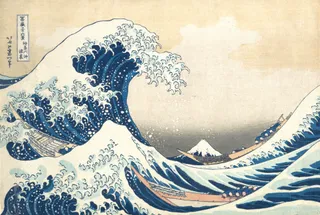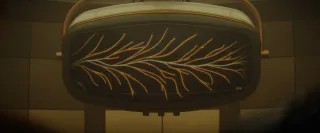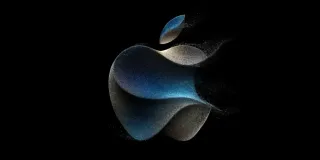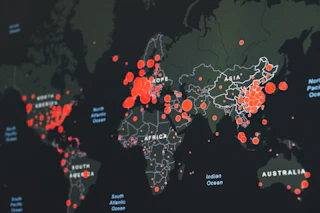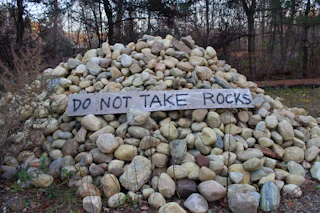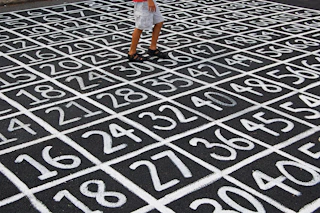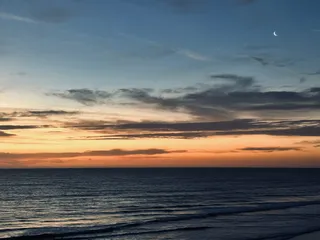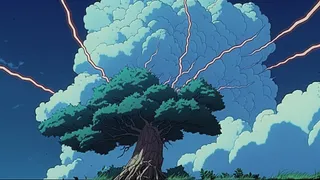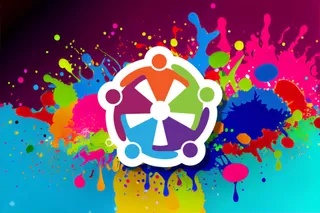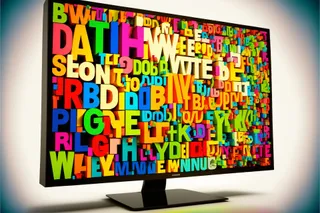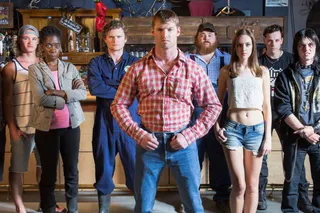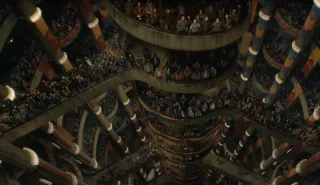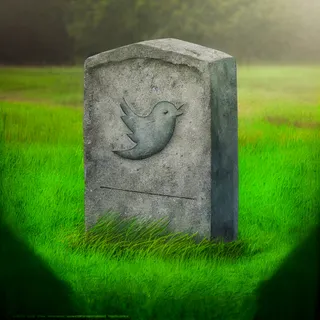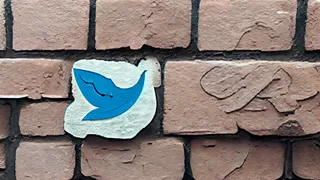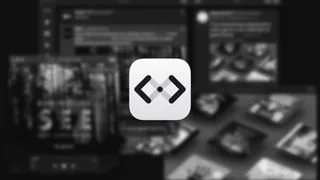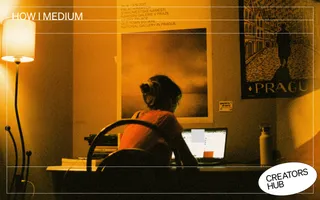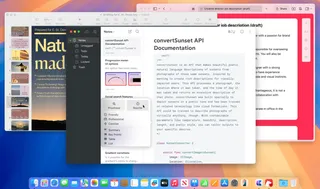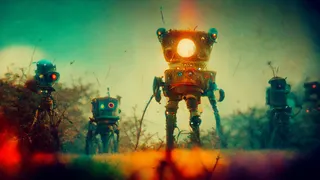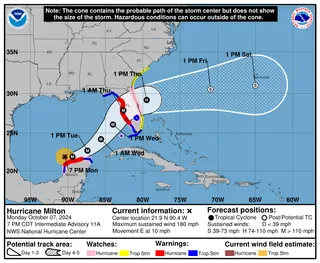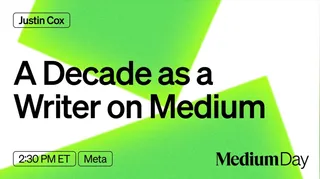AI Is Now Everywhere
This Week In Writing, we talk about Google’s new AI plan, what it means for writers, and why resistance is futile.

A lot happened this week! I’ll discuss Meta’s entry into the Fediverse with Threads in a minute. First, we need to get into how Google is upending the entire internet (again).
Do you remember Google's "I’m Feeling Lucky" button? If you didn't want to bother with Google's ten search results, you could click I'm Feeling Lucky instead of Search and go directly to the first result. Back then, the search engine actually worked.
Of course, that was before ad money became more important than actually connecting people with what they were looking for. With ad money came search engine optimization (SEO). Since people used search engines to, you know, search for things they were looking for, getting a site in the top few results became really important.
Unfortunately, SEO is more about gaming a system than providing relevant information.
Have you ever searched for product reviews only to get a dumb list of affiliate links to Amazon products that quote people's reviews without adding new insight? What about a list of ten apps that do what you're looking for, but one of them happens to be the site you landed on? That's SEO at work, and it generally makes the internet less useful by surfacing people who know how (or have the money) to game Google's system.
The SEO industry is expected to reach an absurd size of $122 billion by 2028. That is, of course, if AI doesn't dramatically render SEO completely irrelevant.
AI is now everywhere.
To protect human creators against AI, the Grammy's said "only human creators" can win awards. They then had to clarify that AI-generated music is "eligible" for nominations, but the AI-generated portions won't be nominated. Whatever that means. Media companies continue to publish factually inaccurate AI-generated content, like the widely shared "Star Wars in Chronological Order" list, which got a lot of things wrong. Oh, and someone created an AI Jesus that preaches and answers questions 24/7.
All of this despite the US Copyright Office declaring AI-generated art cannot be protected with copyright.
Not to be left behind, Google is leaning heavily into AI training. So heavily that last week Google revised its privacy policy to basically say if your website is online, they will use it to train AI models. People online got upset because, well, how dare Google use their robots to scape websites for content! Except that's exactly what Google has been doing for years already.
The Google Search Crawler finds every page online, catalogs, ranks, and stuffs it somewhere in the database, waiting to appear in future search results. This silly little bot crawler is exactly how SEO works, as people know what to feed the crawler to rank highly.
But, here's the thing, while writers are up in arms about their words being used to train AI, Google is going to actually give us all what we really want: useful search.
We don't go to Google to find affiliate-ridden listicles or recipes with someone's entire life story. We go to Google to answer a question or find an actual recipe. If the future of search is an AI chatbot that can actually provide me relevant answers, I'm in. I imagine most people will be, too.
Of course, Google will likely riddle the results with ads, but the key will be to keep people on the page rather than have them link to other websites, which is the bigger issue here.
As writers, discoverability is essential. It's the only way people find the words we write. As searching for information devolves into a chatbot, how will people actually find our work? Short answer: I don't know.
I do know there are a lot of people who rely directly on content writing and SEO. If you're in that boat, I honestly don’t have any suggestions. But, as we’ve seen with third-party apps and businesses built upon Twitter and Reddit, anything entirely dependent on someone else’s decisions needs a backup plan. Unfortunately, it seems like Google is about to prove that point once again.
Threads and Mastodon and Bluesky and I’m Tired
In April, I talked about being an early adopter of new technology. Since Twitter died (and yes, it is dead), I've joined or tested Mastodon, Post, Hive, T2, Bluesky, Substack Notes, and now, Threads.
Meta launched its "not a Twitter competitor" Twitter competitor last week to exponential response. Fueled mainly by the ease of signup, Threads exploded onto the social media scene. But is Threads the next Twitter? Maybe?
I don't actually think there will be another Twitter. It had a unique place in the cultural zeitgeist that put ordinary people side-by-side with the powerful. That likely won't happen again without plenty of guardrails and digital velvet ropes. But, in terms of early activity, it's hard to deny Meta's rapid success here.
That said, I deleted the app shortly after trying it out.
Combine the hyper-stimulation of Bluesky with Instagram's influencers and brands, and you have the chaos that is Threads. Granted, there's a certain something that does feel like Twitter once did -- at least if you weren't a fan of the following feed, chronological timeline, and enjoyed brands trying to act relevant. Threads isn't for me. But it might be for a lot of people.
I’ve read a lot of commentary that asks why Threads exists; it basically replicates functions that are already “working” on Facebook and Instagram. But, I think that’s missing the point.
Instagram is clearly Meta’s flagship product now as Facebook continues to only exist for political Boomers, radio stations, and small businesses that don’t understand the internet. However, Instagram has a much larger demographic and appeal. I think Threads is an attempt to “reboot” Facebook with the IG crowd.
As it stands now, Threads is basically what Facebook started as (there’s no poke, though) — a simple microblogging platform to connect people. Except, this time around it launched with millions of users, a deeply connected social graph, and those pesky brands.
What you get, however, is a bland and uninteresting platform. Ryan over at Garbage Day nailed it by saying:
Threads’ true purpose was to act as a fresh coat of paint for Instagram’s code in the hopes it might make the network relevant again. And Threads is also proof that Meta, even after all these years, still has no other ambition aside from scale.
Regardless of what Threads is or isn't, the bigger story is about the future of the Fediverse, the same platform that connects Mastodon, Pixelfed, and other things running on ActivityPub.
According to the three pitch points that appear when you sign up for Threads, Meta will "soon" connect it to the Fediverse. When that happens, I'll be able to follow and connect with people from my Mastodon server. It means I can control my social media while engaging with people who want to avoid being bothered by that level of detail. Frankly, that's a win for the open internet -- ironic, considering Meta is the definition of closed.
Would it be better if people just joined a Mastodon instance instead of Threads? Probably. But, let's face it, most people aren't early adopters and want things easy -- as evidenced by Threads instant success. And, you know what, there isn't anything wrong with that.
The night Threads launched, I asked Mastodon which platform would close first: Bluesky, Substack Notes, Threads, or Twitter. Over 400 people chimed in, and, not surprisingly to me, the majority said Substack Notes will be the first to die.
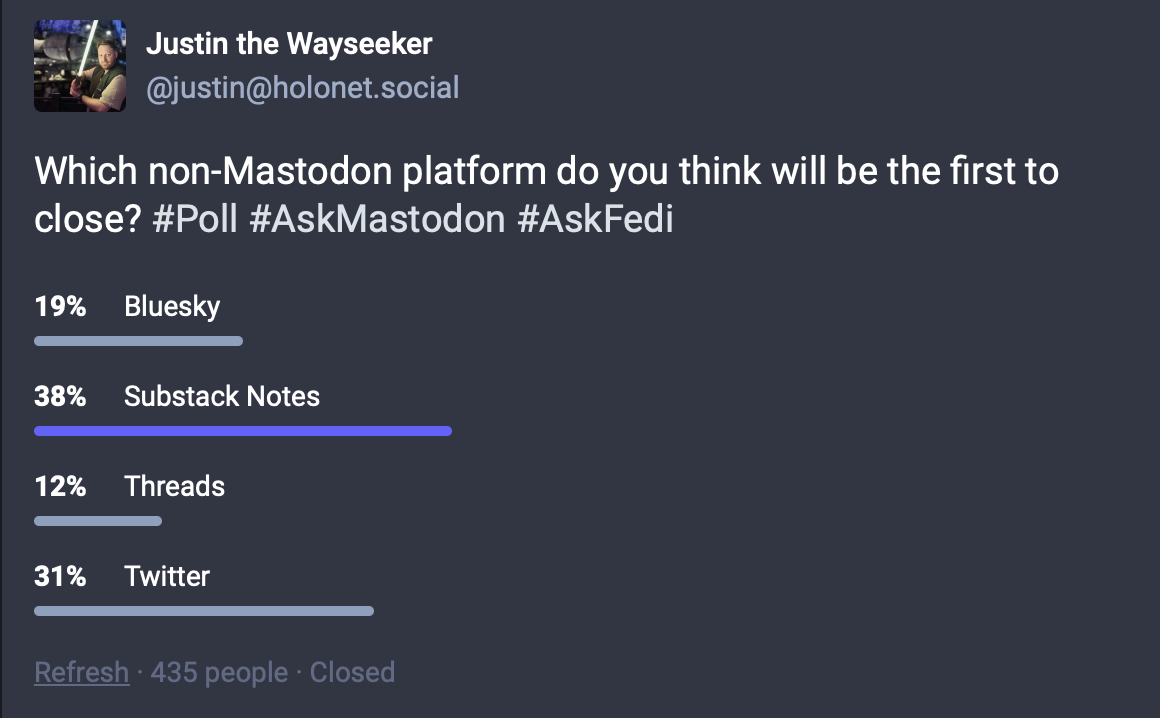
It's no secret that I think Substack is in trouble. The platform's revenue is suspect, to say the least, and they have an uncanny habit of building new features only to completely ignore them after launch. Chat? Basically useless. Notes will likely follow suit.
Threads shows that most people are looking for something that is easy to connect to and where many people will congregate. Its staying power obviously remains to be seen, but the launch was massive.
One quick note: I recently returned to a self-run Mastodon instance, this time on Holonet.Social because Star Wars is amazing. My poll went viral by Mastodon standards, pushing my little server to the limits. I learned a bit since the last time I tried to run a Mastodon instance, and I'm happy to say everything held strong!
I didn't muddle things up by stopping services or killing processes -- things I did in my previous stint as a network administrator. Instead, I let them play out, and the server queues do their job. Everything went smoothly, and I feel like I know a bit more about how this silly internet service works.
CTA question
Speaking of asking questions on Mastodon, a few days back I asked for feedback about calls to action (CTAs) at the bottom of online articles. It's something I've been thinking a lot about lately, and I want your opinion.
What do you think about them? Do you click on people’s CTAs? Do you ignore them? Do you think they’re obnoxious, cheesy, or helpful?
I’m really curious about the perspectives of both writers and readers. Please let me know. Responses will help shape a future article and (possibly) the future policies of The Writing Cooperative.
Summer Schedule
I took last week off for the Fourth of July. At least, that was my excuse. The reality is there is a lot going on in my world right now. I've been prepping for a whole house renovation, so I'm basically moving out.
Almost everything I own is in a box somewhere, and I'm living like I'm in college again -- minus the fun parts. As such, I'm going to move into what I'm calling a Summer Schedule.
For at least July (and possibly part of August, depending on the renovation process), This Week In Writing is turning into Every Other Week In Writing. The following issues will come out on July 25 and August 8. After that, I'll see where things stand.
The Summer Schedule and renovation project is putting my participation in Medium Day into question. Since I have yet to determine where I'll be living or my internet capabilities on August 12, I'm finding it hard to commit to a particular session. I still want to do something; I just want to be realistic about the possibilities and my time.
Anyway, more life updates will come in This Just In, my very occasional personal newsletter that lives exclusively on my website. Interested in some personal news? Subscribe to This Just In.
I'll see you in two weeks!
Related Reads
Don’t Take My Word for It
• CraftThis Just In: Personalized recommendations are the new algorithms and the best way to build a true audience.
Why Make Anything if You Don’t Think It Will Be Great?
• CraftThis Week In Writing, we discuss greatness and how chasing it is a possible and noble goal.
Pay People Not Platforms
• PublishingThis Week In Writing, we look at why Substack’s collapse is actually a good thing for paid newsletters.
Let's Make the Internet Personal Again
• Featured • PublishingThis Week In Writing, we look at the once-in-a-generation opportunity to create a new internet filled with fun and originality.
Raising the Bar at the Writing Cooperative
• EditorialThis Week In Writing, we look at changes to our publication standards and what they mean for you.
Advent, Waiting, and the Year of Transitions
• LifeThis Week In Writing, we look back at the year that was and determine what it means for the year to come.
Refilling the Creativity Tank
• LifeThis Week In Writing, we discuss what happens when creativity finds other outlets.
Celebrate Giving Tuesday
• LifeThis Week In Writing, we take a quick break from our regularly scheduled programming to celebrate nonprofit organizations.
It’s Time We Discuss Medium
• PublishingThis Week In Writing, we address the platform that has supported my writing for nearly a decade.
My First Year on Mastodon and the Future of Social Media
• Social MediaThis Week In Writing, we look back at how social media fractured and why it’s a good thing for us all.
The Economics of a Self-Hosted Newsletter
• PublishingThis Week In Writing, we talk about what happens when you eliminate platforms and go after it on your own.
Trick or Treat?
• CraftThis Week In Writing, we talk about pen names and whether they make sense for writers.
A New Era Begins
• PublishingThis Week In Writing, we explore the internet’s current metamorphosis and how you can be part of the revolution.
My History of Blogging
• PublishingThis Week In Writing, we celebrate the blog, explore the pendulum of online writing, and double down on quality.
An Update on Spam Submissions
• EditorialThis Week In Writing, we talk about spam submissions to The Writing Cooperative and look at some of your thoughts on being called AI.
Would You Want to Know if I Thought Your Writing Sounded Like AI
• EditorialThis Week In Writing, we talk about submissions to The Writing Cooperative and how to avoid false accusations.
How I Feel About Engagement Numbers
• PublishingThis Week In Writing, we discuss what engagement means and if I get discouraged by a perceived lack thereof. Plus, a look at the future (again).
My Writing Is About Building Community
• PublishingThis Week In Writing, we highlight some of the people I’ve met writing online and answer some of your questions.
It’s Time for a Fresh Start
• PublishingThis Week In Writing, we talk about new Apple products, home renovations, and changes to the newsletter.
Choose Your Own Design
• PublishingThis Week In Writing, we explore the wonderful world of blogs, where writers truly get creative.
Expanding Universes Make Better Stories
• CultureThis Week In Writing, we look at how worldbuilding is an essential part of epic storytelling.
Your Questions Answered
• EditorialThis Week In Writing, we recap a successful Medium Day and address some of the questions I didn’t have time to answer.
Saving Frequently Isn’t The Only Way To Backup Your Writing
• CraftThis Week In Writing, we take a hard lesson from the latest Twitter/X hijinks. Plus, we look at what “human writing” means.
MIT Says ChatGPT Improves Bad Writing, But At What Cost?
• AIThis Week In Writing, we explore how ChatGPT and Grammarly are making us all sound the same.
Do CTAs Even Work Anymore?
• PublishingThis Week In Writing, we explore the “necessary evil” of calls to action and ask if they are any better than tacky banner ads.
AI Is Now Everywhere
• AIThis Week In Writing, we talk about Google’s new AI plan, what it means for writers, and why resistance is futile.
My Ghostly Strategy: Avoid the Graveyard
• PublishingThis Week In Writing, we fully explore how I’m building Ghost into a self-hosted content hub and how you can too.
Another Platform Collapses
• Social MediaThis Week In Writing, we talk about Reddit and what it means for centralized communities moving forward.
The Problem With Creative Entitlement
• AIThis Week In Writing, we explore how AI tools amplify the sometimes problematic relationship between creator and consumer
My Return to Journaling Failed Miserably
• LifeThis Week In Writing, we talk about good intentions, rumored Apple products, and buying domain names
Let's Talk About Numbers
• PublishingThis Week In Writing, we talk about the importance of metrics and why I barely pay attention to mine.
ChatGPT, the Writer’s Strike, and the Future of Content Writing
• AIThis Week In Writing, we explore a middle-of-the-road approach to ChatGPT and the future of writing
BlueSky, Mastodon, and Notes; Oh, My!
• Social MediaThis Week In Writing, we talk about all the “Twitter Alternatives” and what makes the most sense for writers.
How Not To Approach an Editor
• EditorialPlus, here is an update on my participation in Medium’s Boost program and how not to approach an editor.
We Have to Talk About Platform Proliferation
• Social MediaThis Week In Writing, we ask why no platform is content on doing one thing well and instead want to do all things poorly.
On Tennis and Writing Breaks
• LifeThis Week In Writing, I discuss my prolonged break from daily writing and follow up on last week’s Substack article.
We Have to Talk About Substack
• Featured • PublishingThis Week In Writing, we talk about Diffusion of Innovation Theory and dying platforms.
I Don't Want to Talk to You on WhatsApp
• Social MediaThis Week In Writing, we address an impersonation issue, talk about scammers, and settle a Mastodon issue.
Stop Creating Quantity and Start Creating Quality
• EditorialThis Week In Writing, we discuss Medium’s new Boost program and why the vast majority of submissions lately have been atrocious.
1903 Days...
• BurnoutThis Week In Writing, we talk about writing streaks and why letting them go is okay.
You Have Questions, I May Have Answers
• CraftThis Week In Writing, we celebrate International Question Day by listening to Selena Gomez. What does that have in common? Keep reading!
AI Is Coming for Content Creators
• AIThis Week In Writing, we look at how AI is changing the content landscape and why that might be a good thing.
The Era of Centralized Platforms Is Over
• Featured • PublishingThis Week In Writing, we discuss whether you should still own a website if you publish on Medium or Substack.
Are You Bound Up
• GrowthThis Week In Writing, we explore the concept of root-bound plants and how we can unknowingly follow the same path.
How Will History Remember Your Writing?
• CraftThis Week In Writing, we talk about the magic found in old books
How I Come Up With Writing Topics
• CultureThis Week In Writing, we explore topic generation while celebrating the best damn band in the land!
Introducing My Writing Community!
• EditorialA new way to connect with writers, discuss your interests, and receive feedback on your creative endeavors.
Are You Begging for Eyes in the Attention Economy
• Featured • PublishingThis Week In Writing, we explore the internet’s move away from the attention economy and how writers can make the web more personal
Use Better Words to Be More Inclusive
• CraftThis Week In Writing, we talk about words to avoid in 2023, a special offer from a friend, and Medium joining Mastodon
What Biases Do You Bring to Your Projects
• CraftThis Week In Writing, we explore biases in our creative pursuits and how those biases can translate to AI-generated content.
Welcome to 2023. Now Take A Nap.
• CraftThis Week In Writing, we kick off a new year with a chat about goals, self-care, and naps.
I Created a New Language in 5th Grade
• LifeThis Week In Writing, we explore our digital legacies, discuss permanence, and close out the year with something new.
What’s the Last Book You Read
• Crafthttps://writingcooperative.com/whats-the-last-book-you-read-5265b44e180e
Success Comes to Those Who Work for It (Usually)
• CraftThis Week In Writing, we talk about success and perseverance through the lens of Simu Liu’s memoir. Oh, and AI writing, too.
Would You Burn Your Entire Archive
• CraftThis Week In Writing, we contemplate throwing out our leftovers and slimming down our digital presence.
Give Thanks to Our AI Overlords
• AIThis Week In Writing, we celebrate Thanksgiving and dive into the ever-improving AI-generated content.
Do You Procrastawrite
• CraftThis Week In Writing, we talk about procrastination and everything we do instead of writing.
Let’s Talk About Money
• FreelancingThis Week In Writing, we talk about earning money as a writer online and check in on NaNoWriMo.
Happy Author’s Day
• CraftThis Week In Writing, we kick off NaNoWriMo by celebrating all the author’s out there, whether published or not.
You’re Invited
• CraftThis Week In Writing, we prepare for NaNoWriMo with a special invitation, but first, we talk about She-Hulk!
Get Ready for NaNoWriMo
• CraftThis Week In Writing, we prepare for National Novel Writing Month (NaNoWriMo) with encouragement and a special offer.
How Do You Deliver Joy
• CraftThis Week In Writing, we discuss how to find your joy and how to spread joy to others.
Let’s Taco ‘Bout Giving the Reader More
• CraftThis Week In Writing, we celebrate National Taco Day by discussing ways to hook the reader and give them more to chew on.
Stop Making Excuses and Write
• CraftThis Week In Writing, we explore excuses we use to avoid writing and discuss methods to get out of our own way.
Are You Registered To Vote?
• LifeThis Week In Writing, we take a quick break from our regularly scheduled programming to encourage you to vote.
Did You Hug Your Boss Today?
• CraftThis Week In Writing, we explore inappropriate workplace dynamics and how that applies to writers.
How Do You Fight Procrastination?
• CraftThis Week In Writing, we explore the bane of most writers’ existence: procrastination. And, yes, it’s different from Writer’s Block.
What Word Makes You Cringe?
• CraftThis Week In Writing, we talk about cringe-worthy words and give a nod to puns, courtesy of Letterkenny.
This Is a Bit Revealing
• CraftThis Week In Writing, I reveal my inner nerd by sharing a personal project. Plus, we look at character creation.
The Stats I Track
• CraftThis Week In Writing, we explore which stats are necessary to track and which are safe to ignore.
Do You Color Outside the Lines?
• CraftThis Week In Writing, we explore taking our writing to places the reader doesn’t expect, like in the film Everything Everywhere All At Once.
Writing Is Exploring The Unknown
• CraftThis Week In Writing, we explore all-or-nothing thinking and learn how to live in the unknown within our work and ourselves.
When Writing Gets Controversial
• CraftThis Week In Writing, we explore the controversial origins of the bikini and how our writing can stoke controversy of its own.
Make Your Writing Space More Comfortable
• CraftThis Month In Writing, we explore simple ways to improve your writing space and the best advice published in June.
You Should Be on Twitter
• Social MediaThis Week In Writing, we explore how I’m shocked how many writers don’t take advantage of Twitter’s potential for writers.
Yoga for Writers
• CraftThis Week In Writing, we get out of the heat and explore yoga as a wellness strategy for creativity and mindfulness.
My Best Advice for Writers: LIVE!
• CraftNext week, I sit down with Sinem Günel to discuss writing, my book, and how you can stay encouraged even when life gets in the way.
You Need a Vacation
• CraftThis Week In Writing, we talk about the importance of pausing because you can’t write all the time.
I Wrote a Book!
• Featured • PublishingThis Week In Writing, I announce my new book and provide an update on the Flash Fiction Writing Challenge!
Can You Write Pulp Fiction?
• CultureThis Week In Writing, we celebrate classic pulp fiction and invite you to explore potentially untapped forms of creativity.
Are You Turning Your Tassel Today?
• CraftThis Week In Writing, we celebrate National Graduation Tassel Day by exploring how we level up as writers.
Is Censorship Changing Your Language?
• Social MediaThis Week In Writing, we explore algorithm-driven ‘anglospeak’ and how words and their meanings change over time.
How You Defined Community
• EditorialThis Week In Writing, we reflect on the meaning of ‘community’ by reading through your responses.
Let’s Get Acquainted
• EditorialThis Month In Writing, I introduce myself and explore the future of The Writing Cooperative.
Are You Organized?
• CraftThis Week In Writing, we look at digital organization techniques to keep all of our drafts, research, and ideas safe.
Define: Community
• EditorialThis Week In Writing, we explore the meaning of community and how writers can better connect with each other.
When’s the Last Time You Visited the Library?
• CraftThis Week In Writing, we celebrate and honor every community’s pillar: the local library and library workers.
Does Your Writing Live Long and Prosper?
• CultureThis Week In Writing, we celebrate First Contact Day by exploring one of the best genres out there: sci-fi!
Do You Need a Day Off?
• CraftThis Week In Writing, we celebrate National Goof Off Day by exploring ways to take a break from writing (and yes, you can take a break).
Beware the Ides of March?
• CraftThis Week In Writing, we reclaim the Ides of March and turn it into a day to celebrate and lift writers worldwide.
Celebrate International Women’s Day With These Writers
• CraftThis Week In Writing, we celebrate International Women’s Day but uplifting and honoring our favorite women authors.
It’s Writing Pancake Day!
• CraftThis Week In Writing, we celebrate Fat Tuesday by cleaning out our pantry of darlings. What are you letting go of?
Let’s Talk About Tags
• PublishingThis Week In Writing, we explore Medium’s new design, selecting the best tags, and how to be humble as a writer.
When Did You Start Writing?
• CraftThis Week In Writing, we emphasize that age is but a number when it comes to writing. You can start at any point in your life.
Why Do You Write?
• CraftThis Week In Writing, we reflect on Dickinson and explore an essential question for every writer: why do you write?
Do you need to get up again?
• CraftThis Week In Writing, we celebrate National Get Up Day by refocusing on our priorities and building healthy writing habits.
Wondering Where Our Newsletter Went?
• EditorialThis Month In Writing, we’re brewing a mug of hot chocolate to enjoy while reading some of your best stories.
Feeling Pressure to Write?
• CultureThis Week In Writing, we explore the life and writing lessons about pressure and perfection from the movie Encanto.
How Big Is Your Diction?
• CraftThis Week In Writing, we break out the thesaurus to compare diction size and explore the power of unique words.
How Do You Write at Work?
• CraftThis Week In Writing, we celebrate Poetry at Work Day by exploring ways to write while on the job without getting distracted (or fired).
It’s the End of the Year as We Know It (and I Feel Tired)
• LifeThis Just In: It’s time to look back at the year that was and set up some hopes and dreams for the year to come, or something like that.
Update Those Mute Filters
• Social MediaThis Just In: Let’s collectively scream into the infinite abyss, find ourselves, and make the world better.
It’s Time to Rebel from Mass Market Social Media
• Featured • Social MediaThis Just In: IT is the villain in Silo. We should learn from those in the Down Deep and rise up.
The Forthcoming First Amendment Fight
• CraftThis Just In: So-called defenders of free speech are taking office, and we’re all in trouble. Plus, more predictions for 2025.
Platforms Are Getting Much Worse
• PublishingThis Just In: Platforms want us to know exactly who controls the internet. It’s not us, but it can be!
The Downside of Personal Platforms
• PublishingCreators need to think carefully about their personal sites and build in a way that prevents link rot.
Maybe I’m Bad at Social Media
• Social MediaSocial media “growth” requires giving in to quantity over quality. I don’t play that game.
Generative AI in Creativity
• AIThe reader survey results have some interesting things to say about generative AI and creativity. Here’s why that’s a problem.
Where Have All the Cowboys Gone
• Social MediaThis Just In: social media is bleeding users, but where are they going?
Pay People Not Platforms
• PublishingThis Week In Writing, we look at why Substack’s collapse is actually a good thing for paid newsletters.
Let's Make the Internet Personal Again
• Featured • PublishingThis Week In Writing, we look at the once-in-a-generation opportunity to create a new internet filled with fun and originality.
My First Year on Mastodon and the Future of Social Media
• Social MediaThis Week In Writing, we look back at how social media fractured and why it’s a good thing for us all.
The Economics of a Self-Hosted Newsletter
• PublishingThis Week In Writing, we talk about what happens when you eliminate platforms and go after it on your own.
A New Era Begins
• PublishingThis Week In Writing, we explore the internet’s current metamorphosis and how you can be part of the revolution.
My Writing Is About Building Community
• PublishingThis Week In Writing, we highlight some of the people I’ve met writing online and answer some of your questions.
Your Questions Answered
• EditorialThis Week In Writing, we recap a successful Medium Day and address some of the questions I didn’t have time to answer.
AI Is Now Everywhere
• AIThis Week In Writing, we talk about Google’s new AI plan, what it means for writers, and why resistance is futile.
BlueSky, Mastodon, and Notes; Oh, My!
• Social MediaThis Week In Writing, we talk about all the “Twitter Alternatives” and what makes the most sense for writers.
I Don't Want to Talk to You on WhatsApp
• Social MediaThis Week In Writing, we address an impersonation issue, talk about scammers, and settle a Mastodon issue.
You Have Questions, I May Have Answers
• CraftThis Week In Writing, we celebrate International Question Day by listening to Selena Gomez. What does that have in common? Keep reading!
The Era of Centralized Platforms Is Over
• Featured • PublishingThis Week In Writing, we discuss whether you should still own a website if you publish on Medium or Substack.
Introducing My Writing Community!
• EditorialA new way to connect with writers, discuss your interests, and receive feedback on your creative endeavors.
Are You Begging for Eyes in the Attention Economy
• Featured • PublishingThis Week In Writing, we explore the internet’s move away from the attention economy and how writers can make the web more personal
Use Better Words to Be More Inclusive
• CraftThis Week In Writing, we talk about words to avoid in 2023, a special offer from a friend, and Medium joining Mastodon
Welcome to 2023. Now Take A Nap.
• CraftThis Week In Writing, we kick off a new year with a chat about goals, self-care, and naps.
I Created a New Language in 5th Grade
• LifeThis Week In Writing, we explore our digital legacies, discuss permanence, and close out the year with something new.
What Bad Bunny Gets That NBC Doesn’t
• CultureThis Just In: NBC hosted the Olympics, the Super Bowl, and Bad Bunny’s halftime show on the same night, so why was their messaging so poor?
This One’s for the Fans
• CultureThis Just In: Jimmy Buffet gets the due he deserves and shows what creative passion is all about.
Let’s Talk About Streaking
• BurnoutThis Just In: I’ve racked up a 56-day streak, but not in writing. Plus, I talk about Eurovision.
Write Like Taylor Swift
• CultureEmbrace life’s many eras and stop trying to be a one-dimensional writer.
Why Is Branding So Difficult?
• PublishingThis Just In: This Week In Writing rebrands; still explores the world with creativity and curiosity.
Advent, Waiting, and the Year of Transitions
• LifeThis Week In Writing, we look back at the year that was and determine what it means for the year to come.
AI Is Now Everywhere
• AIThis Week In Writing, we talk about Google’s new AI plan, what it means for writers, and why resistance is futile.
The Problem With Creative Entitlement
• AIThis Week In Writing, we explore how AI tools amplify the sometimes problematic relationship between creator and consumer
You Have Questions, I May Have Answers
• CraftThis Week In Writing, we celebrate International Question Day by listening to Selena Gomez. What does that have in common? Keep reading!
How I Come Up With Writing Topics
• CultureThis Week In Writing, we explore topic generation while celebrating the best damn band in the land!
This Just in: Horizontal Skyscraper City Coming Soon to the Desert
• LifeEvery post-apocalyptic movie ever made will soon culminate in the Saudi Arabian horizontal skyscraper city.
How To Disconnect From The Internet Without Going Broke
• Social MediaWe can’t hand our social media accounts to a pricey team as celebrities do—but there are actionable steps we can take toward a healthier relationship with media.
Feeling Pressure to Write?
• CultureThis Week In Writing, we explore the life and writing lessons about pressure and perfection from the movie Encanto.
Do You Write Short-Form Content?
• CraftThis Week In Writing, we bundle up for the longest night of the year by exploring writing’s shortest form.
Finding Unconventional Growth Opportunities
• GrowthLiving our best lives requires continual refinement, growth, and education. How are you investing in yourself?
What's On Your Desk-Work Playlist?
• Craft📝 This Week’s Goal: Find music that inspires but doesn’t distract.
Are You Writing For An Audience Or Authenticity?
• Featured • CraftWhat Emily Dickinson’s fictitious life teaches about fame
Get In The Mood: Level Up Your Writing Soundtrack
• CraftHelp your mind focus while having a little fun by setting up a custom writing playlist
Breathe in. Breathe out. Move on.
• BurnoutAre you burnt out? You’re not alone. Take some advice from Jimmy Buffett: Breathe in, breathe out, move on.
This Just In: Support Other Artists
• CraftYou can be a patron of the arts without buying a wing in your local theater
This Just In: Young, Scrappy, and Hungry
• CultureToday we celebrate our Independence Day. From our couch. With musical theater.
What We Can Learn About Writing from Bruce Springsteen
• Featured • CultureIt took Bruce Springsteen six months to write Born to Run. There are a lot of things writers can learn from his process and success.
Understanding Who Owns Your Art
• CultureTaylor Swift’s experience sheds light on an important question: Who owns your art? The answer isn't always clear and impacts your work.
Why be Perpendicular When You Can be Parallel?
• CraftAs the song says, you get three as a magic number. But what you also get is a perfect example of parallel structure.
How to Write When You Don’t Wanna Write (As Told By Other Writers)
• CraftThis article was completely crowdsourced.
How To Be A Successful Freelance Writer
• FreelancingEvery choice brings you closer to success. Or does it?
Girls, Robots, and Rock: Tokyo’s Amazing Robot Restaurant
• Featured • TravelTokyo has a building with LED lights and chrome so bright it’s like staring into the sun. This is Shinjuku’s Robot Restaurant.
It’s Time to Rebel from Mass Market Social Media
• Featured • Social MediaThis Just In: IT is the villain in Silo. We should learn from those in the Down Deep and rise up.
Platforms Are Getting Much Worse
• PublishingThis Just In: Platforms want us to know exactly who controls the internet. It’s not us, but it can be!
Metrics Don’t Matter
• CraftHave we become so accustomed to seeing metrics everywhere that they no longer mean anything?
Why Make Anything if You Don’t Think It Will Be Great?
• CraftThis Week In Writing, we discuss greatness and how chasing it is a possible and noble goal.
Pay People Not Platforms
• PublishingThis Week In Writing, we look at why Substack’s collapse is actually a good thing for paid newsletters.
My First Year on Mastodon and the Future of Social Media
• Social MediaThis Week In Writing, we look back at how social media fractured and why it’s a good thing for us all.
The Economics of a Self-Hosted Newsletter
• PublishingThis Week In Writing, we talk about what happens when you eliminate platforms and go after it on your own.
My History of Blogging
• PublishingThis Week In Writing, we celebrate the blog, explore the pendulum of online writing, and double down on quality.
How I Feel About Engagement Numbers
• PublishingThis Week In Writing, we discuss what engagement means and if I get discouraged by a perceived lack thereof. Plus, a look at the future (again).
My Writing Is About Building Community
• PublishingThis Week In Writing, we highlight some of the people I’ve met writing online and answer some of your questions.
It’s Time for a Fresh Start
• PublishingThis Week In Writing, we talk about new Apple products, home renovations, and changes to the newsletter.
Your Questions Answered
• EditorialThis Week In Writing, we recap a successful Medium Day and address some of the questions I didn’t have time to answer.
Saving Frequently Isn’t The Only Way To Backup Your Writing
• CraftThis Week In Writing, we take a hard lesson from the latest Twitter/X hijinks. Plus, we look at what “human writing” means.
MIT Says ChatGPT Improves Bad Writing, But At What Cost?
• AIThis Week In Writing, we explore how ChatGPT and Grammarly are making us all sound the same.
AI Is Now Everywhere
• AIThis Week In Writing, we talk about Google’s new AI plan, what it means for writers, and why resistance is futile.
My Ghostly Strategy: Avoid the Graveyard
• PublishingThis Week In Writing, we fully explore how I’m building Ghost into a self-hosted content hub and how you can too.
Another Platform Collapses
• Social MediaThis Week In Writing, we talk about Reddit and what it means for centralized communities moving forward.
The Problem With Creative Entitlement
• AIThis Week In Writing, we explore how AI tools amplify the sometimes problematic relationship between creator and consumer
This Just in Comes Home
• PublishingWelcome to the first issue of This Just In completely managed from my website!
BlueSky, Mastodon, and Notes; Oh, My!
• Social MediaThis Week In Writing, we talk about all the “Twitter Alternatives” and what makes the most sense for writers.
We Have to Talk About Platform Proliferation
• Social MediaThis Week In Writing, we ask why no platform is content on doing one thing well and instead want to do all things poorly.
On Tennis and Writing Breaks
• LifeThis Week In Writing, I discuss my prolonged break from daily writing and follow up on last week’s Substack article.
We Have to Talk About Substack
• Featured • PublishingThis Week In Writing, we talk about Diffusion of Innovation Theory and dying platforms.
The Era of Centralized Platforms Is Over
• Featured • PublishingThis Week In Writing, we discuss whether you should still own a website if you publish on Medium or Substack.
Introducing My Writing Community!
• EditorialA new way to connect with writers, discuss your interests, and receive feedback on your creative endeavors.
Let’s Talk About Money
• FreelancingThis Week In Writing, we talk about earning money as a writer online and check in on NaNoWriMo.
Is Revue Too Good to be True?
• FreelancingRevue is a newsletter tool that is deeply integrated with Twitter, but is it the right email marketing tool for freelancers?
This Just In: Social Authenticity
• Social MediaDid the coronavirus force us into an authentic form of social media?
AI Is Not an All or Nothing Choice
• Featured • AIThis Just In: AI use isn't a moral binary. There's a practical middle path for writers.
It’s Time to Rebel from Mass Market Social Media
• Featured • Social MediaThis Just In: IT is the villain in Silo. We should learn from those in the Down Deep and rise up.
Platforms Are Getting Much Worse
• PublishingThis Just In: Platforms want us to know exactly who controls the internet. It’s not us, but it can be!
Where Have All the Cowboys Gone
• Social MediaThis Just In: social media is bleeding users, but where are they going?
Let's Make the Internet Personal Again
• Featured • PublishingThis Week In Writing, we look at the once-in-a-generation opportunity to create a new internet filled with fun and originality.
My First Year on Mastodon and the Future of Social Media
• Social MediaThis Week In Writing, we look back at how social media fractured and why it’s a good thing for us all.
Saving Frequently Isn’t The Only Way To Backup Your Writing
• CraftThis Week In Writing, we take a hard lesson from the latest Twitter/X hijinks. Plus, we look at what “human writing” means.
AI Is Now Everywhere
• AIThis Week In Writing, we talk about Google’s new AI plan, what it means for writers, and why resistance is futile.
Another Platform Collapses
• Social MediaThis Week In Writing, we talk about Reddit and what it means for centralized communities moving forward.
ChatGPT, the Writer’s Strike, and the Future of Content Writing
• AIThis Week In Writing, we explore a middle-of-the-road approach to ChatGPT and the future of writing
BlueSky, Mastodon, and Notes; Oh, My!
• Social MediaThis Week In Writing, we talk about all the “Twitter Alternatives” and what makes the most sense for writers.
We Have to Talk About Platform Proliferation
• Social MediaThis Week In Writing, we ask why no platform is content on doing one thing well and instead want to do all things poorly.
We Have to Talk About Substack
• Featured • PublishingThis Week In Writing, we talk about Diffusion of Innovation Theory and dying platforms.
The Era of Centralized Platforms Is Over
• Featured • PublishingThis Week In Writing, we discuss whether you should still own a website if you publish on Medium or Substack.
Introducing My Writing Community!
• EditorialA new way to connect with writers, discuss your interests, and receive feedback on your creative endeavors.
Use Better Words to Be More Inclusive
• CraftThis Week In Writing, we talk about words to avoid in 2023, a special offer from a friend, and Medium joining Mastodon
I Created a New Language in 5th Grade
• LifeThis Week In Writing, we explore our digital legacies, discuss permanence, and close out the year with something new.
Would You Burn Your Entire Archive
• CraftThis Week In Writing, we contemplate throwing out our leftovers and slimming down our digital presence.
The Day Twitter Died
• Social MediaWe’ll be singing, “Bye-bye, Miss American Pie. Drove my Tesla to the office, but there was just one guy.”
This Just in: Will Twitter Verification Save Twitter
• Social MediaElon Musk wants everyone to pay $8/month for Twitter verification, but will that save the platform or alienate people?
The Fate of The Seven Kingdoms
• Social MediaThe future on social media is much like the Game of Thrones. Right now, the only thing missing is a dragon.
Write Now is My Tribe of Mentors
• CraftWhat I learned from Tim Ferriss’ Tribe of Mentors and my answers to his 11 great questions.
Spring Into the Best Twitter Client You’ve Never Heard Of
• Social MediaHow does the Spring Twitter client by Junyu Kuang stack up to Tweetbot and Twitterrific?
How I Edit and Manage The Writing Cooperative
• EditorialWhat writers and editors can learn from my experience editing The Writing Cooperative, one of Medium’s top publications
You Should Be on Twitter
• Social MediaThis Week In Writing, we explore how I’m shocked how many writers don’t take advantage of Twitter’s potential for writers.
How To Disconnect From The Internet Without Going Broke
• Social MediaWe can’t hand our social media accounts to a pricey team as celebrities do—but there are actionable steps we can take toward a healthier relationship with media.
Beware the Ides of March?
• CraftThis Week In Writing, we reclaim the Ides of March and turn it into a day to celebrate and lift writers worldwide.
Is Revue Too Good to be True?
• FreelancingRevue is a newsletter tool that is deeply integrated with Twitter, but is it the right email marketing tool for freelancers?
Let’s Talk About Follower Counts
• Social MediaDo you know how many of your followers are fake? Chances are, it’s a lot more than you think. As a result, following numbers are useless.
How To Make Social Media Great Again
• Social MediaIf you have 30 minutes, you have everything necessary to enjoy social media
Twitter To The Rescue
• Social Media📝 This Week’s Goal: Learn how to leverage Twitter to market your writing and build your audience.
It’s Time to Verify the Internet
• Social MediaTwitter’s new Birdwatch feature is a good step, but more needs to be done.
How To Be A Successful Freelance Writer
• FreelancingEvery choice brings you closer to success. Or does it?
So, You’re New to Medium…
• PublishingAre you new to Medium? Do you want to make the most of your new account and start writing and making money? This is the guide you need.
AI Is Not an All or Nothing Choice
• Featured • AIThis Just In: AI use isn't a moral binary. There's a practical middle path for writers.
Unchecked Writing
• AIThis Just In: I stopped using Grammarly; have you noticed? Plus, a deeper exploration into AI writing and my friend the em dash.
Want to Write a Novel in November?
• CraftThis Just In: NaNoWriMo may be dead, but writers have two new options to help hit those writing goals.
AI Exposes the Deeper Rifts in the Writing Industry
• AIThis Just In: Monetization turns passions into sweatshops and AI is making it worse.
AI Killed NaNoWriMo
• AIThis Just In: The writing month challenge may be dead, but there’s a new option to keep writers going.
A Few More Thoughts on Copyright
• AIThis Just In: The history of copyright might be fraught, but it exposes a bigger issue when creating online.
Copyright in the Age of AI
• AIThis Just In: What does copyright do and does it even matter anymore?
Is Reading Dying
• CraftThis Just In: AI summaries and the pivot to video are bad news for the written word.
Are Apple’s Writing Tools the Right Stuff
• AIThis Just In: Apple Intelligence offers the boring version of AI I’ve hoped for, but is it helpful for writers?
Hitting the Reset Button
• PublishingLLM scraping is a virus eating up the internet, but I’m done fighting. Instead, I choose open access and human connection.
Is Generative AI Destroying the Open Web
• AISubscription walls prevent AI scraping, but at what cost? I’m rethinking my whole publishing strategy.
Is Apple Intelligence the AI for the Rest of Us
• AIThis Just In: Apple’s forthcoming entry into AI promises a private, personalized AI, but will it increase AI slop?
Generative AI in Creativity
• AIThe reader survey results have some interesting things to say about generative AI and creativity. Here’s why that’s a problem.
What Is Your Freelance Writing Rate
• FreelancingWriting jobs are evaporating for many reasons, but freelance rates were really bad long before AI came around.
Can We Find a Balance With AI?
• AIThe dichotomy of AI continues to baffle me as I see the good and the bad. Where do we draw the line, and how do we learn to live with this technology?
Don’t Feed the AI Beast
• AIThis Just In: Justin’s writing requires a subscription to prevent AI abuse; consider your own precautions.
An Update on Spam Submissions
• EditorialThis Week In Writing, we talk about spam submissions to The Writing Cooperative and look at some of your thoughts on being called AI.
Would You Want to Know if I Thought Your Writing Sounded Like AI
• EditorialThis Week In Writing, we talk about submissions to The Writing Cooperative and how to avoid false accusations.
Saving Frequently Isn’t The Only Way To Backup Your Writing
• CraftThis Week In Writing, we take a hard lesson from the latest Twitter/X hijinks. Plus, we look at what “human writing” means.
MIT Says ChatGPT Improves Bad Writing, But At What Cost?
• AIThis Week In Writing, we explore how ChatGPT and Grammarly are making us all sound the same.
AI Is Now Everywhere
• AIThis Week In Writing, we talk about Google’s new AI plan, what it means for writers, and why resistance is futile.
The Problem With Creative Entitlement
• AIThis Week In Writing, we explore how AI tools amplify the sometimes problematic relationship between creator and consumer
ChatGPT, the Writer’s Strike, and the Future of Content Writing
• AIThis Week In Writing, we explore a middle-of-the-road approach to ChatGPT and the future of writing
How I Use Midjourney to Create Featured Images for Articles
• AIGenerating unique and interesting featured images, you only need a Discord account and a little patience. Here’s how I use the tool.
AI Is Coming for Content Creators
• AIThis Week In Writing, we look at how AI is changing the content landscape and why that might be a good thing.
What Biases Do You Bring to Your Projects
• CraftThis Week In Writing, we explore biases in our creative pursuits and how those biases can translate to AI-generated content.
Success Comes to Those Who Work for It (Usually)
• CraftThis Week In Writing, we talk about success and perseverance through the lens of Simu Liu’s memoir. Oh, and AI writing, too.
Give Thanks to Our AI Overlords
• AIThis Week In Writing, we celebrate Thanksgiving and dive into the ever-improving AI-generated content.
This Just In: the Robots Are Coming for You
• AIThis Week In Writing, we take a quick break from our regularly scheduled programming to encourage you to vote.
Are Robots Taking Your Job?
• AI📝 This Week’s Goal: Focus on your own writing instead of the robot uprising
Creative Burnout and Why I’m Pausing The Writing Cooperative After 12 Years
• Featured • EditorialAlysa Liu's story is relatable and the timing is impeccable.
What Bad Bunny Gets That NBC Doesn’t
• CultureThis Just In: NBC hosted the Olympics, the Super Bowl, and Bad Bunny’s halftime show on the same night, so why was their messaging so poor?
AI Is Not an All or Nothing Choice
• Featured • AIThis Just In: AI use isn't a moral binary. There's a practical middle path for writers.
It’s the End of the Year as We Know It (and I Feel Tired)
• LifeThis Just In: It’s time to look back at the year that was and set up some hopes and dreams for the year to come, or something like that.
Unchecked Writing
• AIThis Just In: I stopped using Grammarly; have you noticed? Plus, a deeper exploration into AI writing and my friend the em dash.
The Dream of EPCOT
• LifeThis Just In: Walt Disney’s community of tomorrow is a celebration of humanity and a prototype for how we should live. Maybe we should listen.
It’s Not All About the Benjamins
• PublishingThis Just In: Yet one more thing that Diddy was wrong about.
The Internet Was Doomed From the Start
• Featured • PublishingThis Just In: Maybe it’s time to rethink the entire internet.
Want to Write a Novel in November?
• CraftThis Just In: NaNoWriMo may be dead, but writers have two new options to help hit those writing goals.
Answers to a Few Questions
• CraftThis Just In: There were fewer questions than I anticipated, but I will answer them nonetheless.
What Questions Do You Have
• CraftThis Just In: I won’t be participating in Medium Day this year, but I still want to keep the spirit alive. Ask me anything.
What I Did Different With This Book
• PublishingThis Just In: Launching a second edition wasn’t as simple as I thought it’d be, and I learned some lessons along the way.
Introducing Write Now’s Revised Second Edition!
• Featured • PublishingThis Just In: You can now access everything I’ve learned writing online over the last two-plus decades. Are you ready for it?
Can We Talk About Comments?
• PublishingThis Just In: Hearing from readers is a lot of fun until you start to get spammed with bots and AI nonsense farming for attention.
Let’s Talk About Tools
• TechThis Just In: There’s no single tool that can do everything and it’s extremely frustrating.
Battle of the Book Builders
• TechThis Just In: I tried to format my book using Vellum and Atticus. Instead, I learned something about app design and limitations.
Does My Journal Need a Backup
• TechThis Just In: I took a lot of your suggestions to heart and gave Obsidian a try. What I found was a bigger question.
Journals Aren’t Forever
• TechThis Just In: After over 13 years, I’ve deleted the Day One journal app. Here’s what it helped me realize about software subscriptions.
This One Has No Direction
• BurnoutThis Just In: Tried, drained, and a little burnt out isn’t exactly the best time to focus on your writing, but it’s why you do it anyway.
AI Exposes the Deeper Rifts in the Writing Industry
• AIThis Just In: Monetization turns passions into sweatshops and AI is making it worse.
The Cost of Rebellion
• Featured • Social MediaThis Just In: Rebellions are built on hope, but they require individual sacrifices for collective improvement.
Abuse of Power Comes for Nonprofits
• LifeThis Just In: Wikipedia’s 501(c)(3) tax exemption is threatened, but not by the IRS.
How to Move to Ghost In 2025
• PublishingThis Just In: Own your own publication by launching a website running Ghost. It’s not as difficult as it sounds.
AI Killed NaNoWriMo
• AIThis Just In: The writing month challenge may be dead, but there’s a new option to keep writers going.
The Age of Reaction
• Social MediaThis Just In: We’ve fallen into a dramascroll trap that will be very difficult to climb out of, but it isn’t impossible.
A Few More Thoughts on Copyright
• AIThis Just In: The history of copyright might be fraught, but it exposes a bigger issue when creating online.
Copyright in the Age of AI
• AIThis Just In: What does copyright do and does it even matter anymore?
Tapestry Is Weaving the Future Web
• TechThis Just In: The Iconfactory’s smash new app is a return to the web’s roots and where we all need to head.
The Cost of Simplification
• PublishingThis Just In: Owning your own platform can be complicated and sometimes simplifying can be costly.
A Bit About Me
• Featured • This Just InThis Just In: I answer interview questions that cover my views on writing and more.
The Perils of Personal Platforms
• PublishingWhat does it actually mean to leave the world of commercial platforms behind?
Update Those Mute Filters
• Social MediaThis Just In: Let’s collectively scream into the infinite abyss, find ourselves, and make the world better.
It’s Time to Rebel from Mass Market Social Media
• Featured • Social MediaThis Just In: IT is the villain in Silo. We should learn from those in the Down Deep and rise up.
The Forthcoming First Amendment Fight
• CraftThis Just In: So-called defenders of free speech are taking office, and we’re all in trouble. Plus, more predictions for 2025.
What Happens When Everything is Paywalled
• PublishingThis Just In: Wealth is becoming a determining factor in the type of World Wide Web you can access. And I’m not talking about speed.
Platforms Are Getting Much Worse
• PublishingThis Just In: Platforms want us to know exactly who controls the internet. It’s not us, but it can be!
Is Reading Dying
• CraftThis Just In: AI summaries and the pivot to video are bad news for the written word.
Empire Strikes Back Isn’t the End of the Series
• Featured • LifeThis Just In: Last week sucked, but there is always hope.
Are Apple’s Writing Tools the Right Stuff
• AIThis Just In: Apple Intelligence offers the boring version of AI I’ve hoped for, but is it helpful for writers?
This One’s for the Fans
• CultureThis Just In: Jimmy Buffet gets the due he deserves and shows what creative passion is all about.
When Creating Stops Being Fun
• CraftThis Just In: knowing when (and how) to hit delete is important for every creator’s sanity.
We Shouldn’t Have Taken Milton’s Stapler...
• LifeThis Just In: Hurricane Milton is becoming a real problem, and I’m exhausted.
When Gamification Goes Awry
• TechWriting days, health rings, Duolingo… there are more streaks than time.
New Phone Who Dis
• TechNew technology fuels a desire to create but can also be overwhelming and lead to unmet expectations.
Hitting the Reset Button
• PublishingLLM scraping is a virus eating up the internet, but I’m done fighting. Instead, I choose open access and human connection.
Advice for Medium Writers Choose Publications Wisely
• PublishingJust because you CAN submit to a specific publication doesn’t mean you SHOULD.
Medium Day 2024: Questions I Didn't Have Time to Answer
• PublishingA collection of all the questions I didn’t have time for during my 30-minute Medium Day presentation.
Is Generative AI Destroying the Open Web
• AISubscription walls prevent AI scraping, but at what cost? I’m rethinking my whole publishing strategy.
Our Words Are Our Legacy
• CraftCreativity is a clash between individualism and our connection to history.
Fandom Is Being Ruined by "Fans"
• Featured • CultureHow review-bombing and constant, unfounded criticism takes agency away from creators
The Downside of Personal Platforms
• PublishingCreators need to think carefully about their personal sites and build in a way that prevents link rot.
Is Apple Intelligence the AI for the Rest of Us
• AIThis Just In: Apple’s forthcoming entry into AI promises a private, personalized AI, but will it increase AI slop?
Maybe I’m Bad at Social Media
• Social MediaSocial media “growth” requires giving in to quantity over quality. I don’t play that game.
Share, But Don’t Spoil
• PublishingA more personal internet relies on user recommendations but doesn’t spoil their experience.
Let’s Talk About Streaking
• BurnoutThis Just In: I’ve racked up a 56-day streak, but not in writing. Plus, I talk about Eurovision.
Chase Your Dreams and See What Happens
• LifeThis Just In: Mental health is a massive part of confidence and success. Dreams are inspiration. Use them.
Generative AI in Creativity
• AIThe reader survey results have some interesting things to say about generative AI and creativity. Here’s why that’s a problem.
What Is Your Freelance Writing Rate
• FreelancingWriting jobs are evaporating for many reasons, but freelance rates were really bad long before AI came around.
Why Criticize When You Can Celebrate?
• Featured • CraftThe attention economy destroyed our ability to dream for the sake of page views. It’s time we refocus our attention.
Can We Find a Balance With AI?
• AIThe dichotomy of AI continues to baffle me as I see the good and the bad. Where do we draw the line, and how do we learn to live with this technology?
Where Have All the Cowboys Gone
• Social MediaThis Just In: social media is bleeding users, but where are they going?
Write Like Taylor Swift
• CultureEmbrace life’s many eras and stop trying to be a one-dimensional writer.
Metrics Don’t Matter
• CraftHave we become so accustomed to seeing metrics everywhere that they no longer mean anything?
Celebrating a Decade on Medium
• Featured • PublishingLooking back at the past ten years of writing on Medium and what comes next.
Creation and Destruction Are Connected
• CraftThis Just In: The act of creating something is more important than the act of publishing what is made.
Don’t Take My Word for It
• CraftThis Just In: Personalized recommendations are the new algorithms and the best way to build a true audience.
Don’t Feed the AI Beast
• AIThis Just In: Justin’s writing requires a subscription to prevent AI abuse; consider your own precautions.
Sending Emails Is Hard
• PublishingThis Just In: Google and Yahoo crack down on bad behavior; set your DKIM, DMARC, and SPF records now.
Why Is Branding So Difficult?
• PublishingThis Just In: This Week In Writing rebrands; still explores the world with creativity and curiosity.
Why Make Anything if You Don’t Think It Will Be Great?
• CraftThis Week In Writing, we discuss greatness and how chasing it is a possible and noble goal.
Pay People Not Platforms
• PublishingThis Week In Writing, we look at why Substack’s collapse is actually a good thing for paid newsletters.
Let's Make the Internet Personal Again
• Featured • PublishingThis Week In Writing, we look at the once-in-a-generation opportunity to create a new internet filled with fun and originality.
Raising the Bar at the Writing Cooperative
• EditorialThis Week In Writing, we look at changes to our publication standards and what they mean for you.
Advent, Waiting, and the Year of Transitions
• LifeThis Week In Writing, we look back at the year that was and determine what it means for the year to come.
Refilling the Creativity Tank
• LifeThis Week In Writing, we discuss what happens when creativity finds other outlets.
Celebrate Giving Tuesday
• LifeThis Week In Writing, we take a quick break from our regularly scheduled programming to celebrate nonprofit organizations.
It’s Time We Discuss Medium
• PublishingThis Week In Writing, we address the platform that has supported my writing for nearly a decade.
My First Year on Mastodon and the Future of Social Media
• Social MediaThis Week In Writing, we look back at how social media fractured and why it’s a good thing for us all.
The Economics of a Self-Hosted Newsletter
• PublishingThis Week In Writing, we talk about what happens when you eliminate platforms and go after it on your own.
Trick or Treat?
• CraftThis Week In Writing, we talk about pen names and whether they make sense for writers.
A New Era Begins
• PublishingThis Week In Writing, we explore the internet’s current metamorphosis and how you can be part of the revolution.
My History of Blogging
• PublishingThis Week In Writing, we celebrate the blog, explore the pendulum of online writing, and double down on quality.
An Update on Spam Submissions
• EditorialThis Week In Writing, we talk about spam submissions to The Writing Cooperative and look at some of your thoughts on being called AI.
Would You Want to Know if I Thought Your Writing Sounded Like AI
• EditorialThis Week In Writing, we talk about submissions to The Writing Cooperative and how to avoid false accusations.
How I Feel About Engagement Numbers
• PublishingThis Week In Writing, we discuss what engagement means and if I get discouraged by a perceived lack thereof. Plus, a look at the future (again).
My Writing Is About Building Community
• PublishingThis Week In Writing, we highlight some of the people I’ve met writing online and answer some of your questions.
It’s Time for a Fresh Start
• PublishingThis Week In Writing, we talk about new Apple products, home renovations, and changes to the newsletter.
Choose Your Own Design
• PublishingThis Week In Writing, we explore the wonderful world of blogs, where writers truly get creative.
Expanding Universes Make Better Stories
• CultureThis Week In Writing, we look at how worldbuilding is an essential part of epic storytelling.
Your Questions Answered
• EditorialThis Week In Writing, we recap a successful Medium Day and address some of the questions I didn’t have time to answer.
Saving Frequently Isn’t The Only Way To Backup Your Writing
• CraftThis Week In Writing, we take a hard lesson from the latest Twitter/X hijinks. Plus, we look at what “human writing” means.
MIT Says ChatGPT Improves Bad Writing, But At What Cost?
• AIThis Week In Writing, we explore how ChatGPT and Grammarly are making us all sound the same.
Do CTAs Even Work Anymore?
• PublishingThis Week In Writing, we explore the “necessary evil” of calls to action and ask if they are any better than tacky banner ads.
AI Is Now Everywhere
• AIThis Week In Writing, we talk about Google’s new AI plan, what it means for writers, and why resistance is futile.
My Ghostly Strategy: Avoid the Graveyard
• PublishingThis Week In Writing, we fully explore how I’m building Ghost into a self-hosted content hub and how you can too.
Another Platform Collapses
• Social MediaThis Week In Writing, we talk about Reddit and what it means for centralized communities moving forward.
The Problem With Creative Entitlement
• AIThis Week In Writing, we explore how AI tools amplify the sometimes problematic relationship between creator and consumer
The Internet Was Doomed From the Start
• Featured • PublishingThis Just In: Maybe it’s time to rethink the entire internet.
Can We Talk About Comments?
• PublishingThis Just In: Hearing from readers is a lot of fun until you start to get spammed with bots and AI nonsense farming for attention.
The Cost of Rebellion
• Featured • Social MediaThis Just In: Rebellions are built on hope, but they require individual sacrifices for collective improvement.
The Age of Reaction
• Social MediaThis Just In: We’ve fallen into a dramascroll trap that will be very difficult to climb out of, but it isn’t impossible.
Tapestry Is Weaving the Future Web
• TechThis Just In: The Iconfactory’s smash new app is a return to the web’s roots and where we all need to head.
Update Those Mute Filters
• Social MediaThis Just In: Let’s collectively scream into the infinite abyss, find ourselves, and make the world better.
It’s Time to Rebel from Mass Market Social Media
• Featured • Social MediaThis Just In: IT is the villain in Silo. We should learn from those in the Down Deep and rise up.
The Forthcoming First Amendment Fight
• CraftThis Just In: So-called defenders of free speech are taking office, and we’re all in trouble. Plus, more predictions for 2025.
Platforms Are Getting Much Worse
• PublishingThis Just In: Platforms want us to know exactly who controls the internet. It’s not us, but it can be!
Maybe I’m Bad at Social Media
• Social MediaSocial media “growth” requires giving in to quantity over quality. I don’t play that game.
Where Have All the Cowboys Gone
• Social MediaThis Just In: social media is bleeding users, but where are they going?
My First Year on Mastodon and the Future of Social Media
• Social MediaThis Week In Writing, we look back at how social media fractured and why it’s a good thing for us all.
Saving Frequently Isn’t The Only Way To Backup Your Writing
• CraftThis Week In Writing, we take a hard lesson from the latest Twitter/X hijinks. Plus, we look at what “human writing” means.
AI Is Now Everywhere
• AIThis Week In Writing, we talk about Google’s new AI plan, what it means for writers, and why resistance is futile.
Another Platform Collapses
• Social MediaThis Week In Writing, we talk about Reddit and what it means for centralized communities moving forward.
BlueSky, Mastodon, and Notes; Oh, My!
• Social MediaThis Week In Writing, we talk about all the “Twitter Alternatives” and what makes the most sense for writers.
We Have to Talk About Platform Proliferation
• Social MediaThis Week In Writing, we ask why no platform is content on doing one thing well and instead want to do all things poorly.
I Don't Want to Talk to You on WhatsApp
• Social MediaThis Week In Writing, we address an impersonation issue, talk about scammers, and settle a Mastodon issue.
You Have Questions, I May Have Answers
• CraftThis Week In Writing, we celebrate International Question Day by listening to Selena Gomez. What does that have in common? Keep reading!
Introducing My Writing Community!
• EditorialA new way to connect with writers, discuss your interests, and receive feedback on your creative endeavors.
Use Better Words to Be More Inclusive
• CraftThis Week In Writing, we talk about words to avoid in 2023, a special offer from a friend, and Medium joining Mastodon
Would You Burn Your Entire Archive
• CraftThis Week In Writing, we contemplate throwing out our leftovers and slimming down our digital presence.
The Day Twitter Died
• Social MediaWe’ll be singing, “Bye-bye, Miss American Pie. Drove my Tesla to the office, but there was just one guy.”
This Just in: Will Twitter Verification Save Twitter
• Social MediaElon Musk wants everyone to pay $8/month for Twitter verification, but will that save the platform or alienate people?
The Fate of The Seven Kingdoms
• Social MediaThe future on social media is much like the Game of Thrones. Right now, the only thing missing is a dragon.
How Do You Deliver Joy
• CraftThis Week In Writing, we discuss how to find your joy and how to spread joy to others.
Spring Into the Best Twitter Client You’ve Never Heard Of
• Social MediaHow does the Spring Twitter client by Junyu Kuang stack up to Tweetbot and Twitterrific?
You Should Be on Twitter
• Social MediaThis Week In Writing, we explore how I’m shocked how many writers don’t take advantage of Twitter’s potential for writers.
Is Censorship Changing Your Language?
• Social MediaThis Week In Writing, we explore algorithm-driven ‘anglospeak’ and how words and their meanings change over time.
How To Disconnect From The Internet Without Going Broke
• Social MediaWe can’t hand our social media accounts to a pricey team as celebrities do—but there are actionable steps we can take toward a healthier relationship with media.
Beware the Ides of March?
• CraftThis Week In Writing, we reclaim the Ides of March and turn it into a day to celebrate and lift writers worldwide.
Is Revue Too Good to be True?
• FreelancingRevue is a newsletter tool that is deeply integrated with Twitter, but is it the right email marketing tool for freelancers?
Is It Time To Unplug?
• Social MediaAcknowledging our dependence on technology is crucial to developing better methods to prevent addiction and abuse.
Your Audience Is Out There
• CraftThere’s an audience for everything, no matter how mainstream or obscure. As we create our audience will slowly build.
Want to be a better storyteller? Start watching TikTok.
• Social MediaUp your storytelling game by following master TikTok storytellers who succinctly tell complete stories in less than three minutes.
We Are Not Competitors
• CraftInstead of looking at other writers as competitors fighting each other for work, we should start to see each other as colleagues.
Facebook is Not the Solution for Freelancers and Small Businesses
• FreelancingFacebook is not the solution to small business marketing. Take ownership of your content and invest in a dedicated website.
Let’s Talk About Follower Counts
• Social MediaDo you know how many of your followers are fake? Chances are, it’s a lot more than you think. As a result, following numbers are useless.
How To Make Social Media Great Again
• Social MediaIf you have 30 minutes, you have everything necessary to enjoy social media
Twitter To The Rescue
• Social Media📝 This Week’s Goal: Learn how to leverage Twitter to market your writing and build your audience.
It’s Time to Verify the Internet
• Social MediaTwitter’s new Birdwatch feature is a good step, but more needs to be done.
This Just In: Social Authenticity
• Social MediaDid the coronavirus force us into an authentic form of social media?
Get Off The Internet
• LifeThe alternatives to healthy boundaries are burnout and broken relationships.
A Comprehensive List of Everyone Still Using Facebook
• Social MediaAre you considering deleting Facebook? Are you fearful you’ll miss out on something amazing if you wipe the account from your life?
How I Became A Villain on Christian Radio
• Featured • Social MediaAnd a Social Media Expert at the Same Time
An Instagram Scavenger Hunt for Free Art Friday in Atlanta
• Featured • Social MediaHow Instagram and the #fafatl hashtag created the Free Art Friday scavenger hunt throughout Atlanta for free, original works of art.



